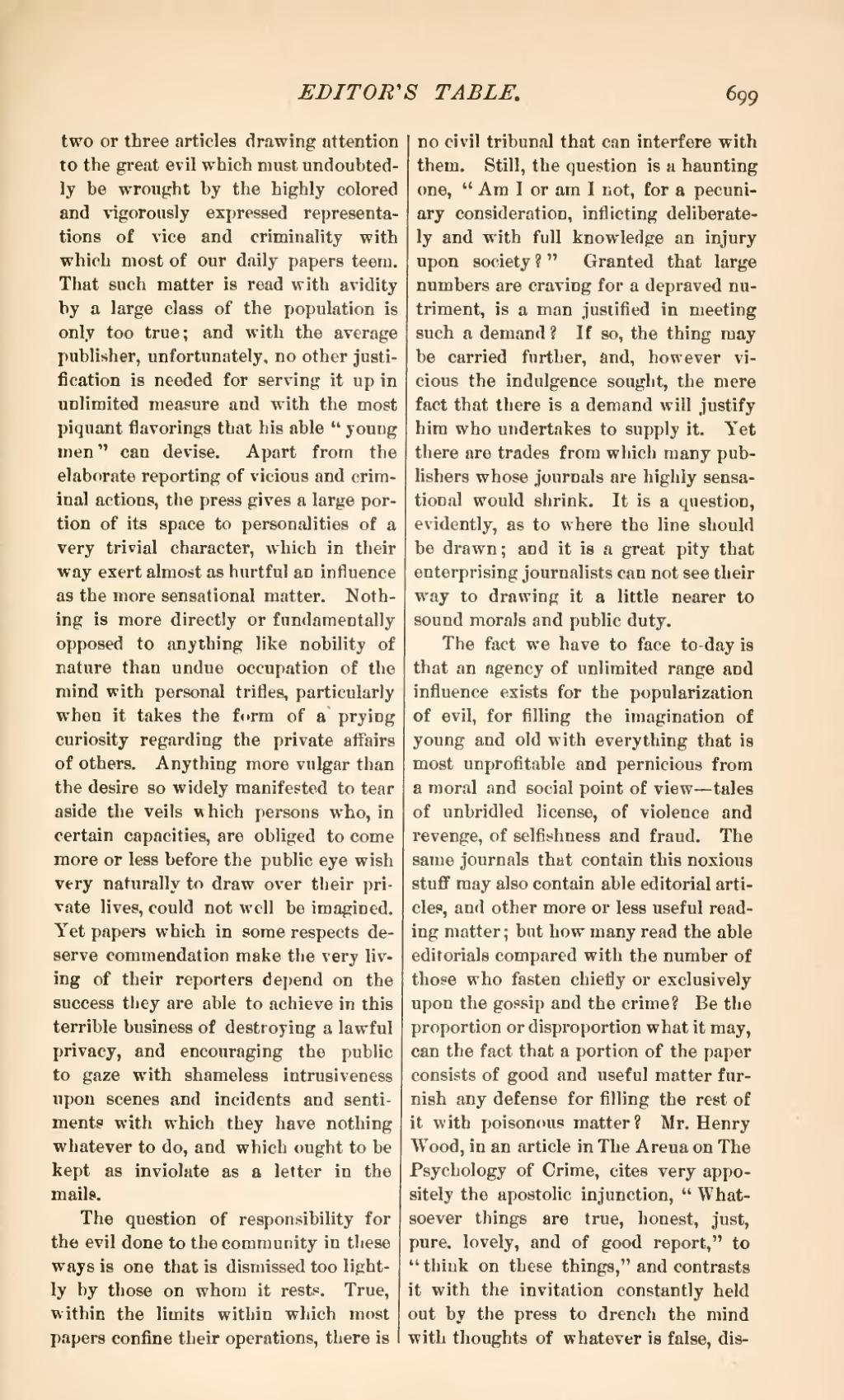two or three articles drawing attention to the great evil which must undoubtedly be wrought by the highly colored and vigorously expressed representations of vice and criminality with which most of our daily papers teem. That such matter is read with avidity by a large class of the population is only too true; and with the average publisher, unfortunately, no other Justification is needed for serving it up in unlimited measure and with the most piquant flavorings that his able "young men" can devise. Apart from the elaborate reporting of vicious and criminal actions, the press gives a large portion of its space to personalities of a very trivial character, which in their way exert almost as hurtful an influence as the more sensational matter. Nothing is more directly or fundamentally opposed to anything like nobility of nature than undue occupation of the mind with personal trifles, particularly when it takes the form of a prying curiosity regarding the private affairs of others. Anything more vulgar than the desire so widely manifested to tear aside the veils which persons who, in certain capacities, are obliged to come more or less before the public eye wish very naturally to draw over their private lives, could not well be imagined. Yet papers which in some respects deserve commendation make the very living of their reporters depend on the success they are able to achieve in this terrible business of destroying a lawful privacy, and encouraging the public to gaze with shameless intrusiveness upon scenes and incidents and sentiments with which they have nothing whatever to do, and which ought to he kept as inviolate as a letter in the mails.
The question of responsibility for the evil done to the community in these ways is one that is dismissed too lightly by those on whom it rests. True, within the limits within which most papers confine their operations, there is no civil tribunal that can interfere with them. Still, the question is a haunting one, "Am I or am I not, for a pecuniary consideration, inflicting deliberately and with full knowledge an injury upon society?" Granted that large numbers are craving for a depraved nutriment, is a man justified in meeting such a demand? If so, the thing may be carried further, and, however vicious the indulgence sought, the mere fact that there is a demand will justify him who undertakes to supply it. Yet there are trades from which many publishers whose journals are highly sensational would shrink. It is a question, evidently, as to where the line should be drawn; and it is a great pity that enterprising journalists can not see their way to drawing it a little nearer to sound morals and public duty.
The fact we have to face to-day is that an agency of unlimited range and influence exists for the popularization of evil, for filling the imagination of young and old with everything that is most unprofitable and pernicious from a moral and social point of view—tales of unbridled license, of violence and revenge, of selfishness and fraud. The same journals that contain this noxious stuff may also contain able editorial articles, and other more or less useful reading matter; but how many read the able editorials compared with the number of those who fasten chiefly or exclusively upon the gossip and the crime? Be the proportion or disproportion what it may, can the fact that a portion of the paper consists of good and useful matter furnish any defense for filling the rest of it with poisonous matter? Mr. Henry Wood, in an article in The Aruna on The Psychology of Crime, cites very appositely the apostolic injunction, "Whatsoever things are true, honest, just, pure, lovely, and of good report," to "think on these things," and contrasts it with the invitation constantly held out by the press to drench the mind with thoughts of whatever is false, dis-

